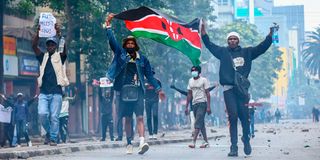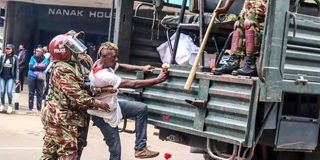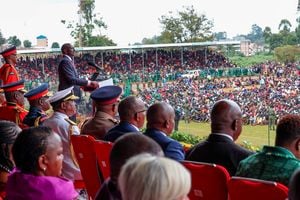
President Ruto arrives in Kwale County for the Mashujaa Day celebrations and is received by Deputy President-in-waiting Kithure Kindiki.
As President William Ruto leads the country in Mashujaa Day celebrations, the focus will also be on the odd absence of the deputy president following the impeachment of Mr Rigathi Gachagua and the court order blocking his replacement Prof Kithure Kindiki.
It will be a one-of-a-kind event clouded by the drama following Mr Gachagua’s impeachment process in Parliament.
Mr Gachagua was removed from office by the Senate on Thursday night, October 17, after his impeachment by the National Assembly despite putting up a spirited legal battle.
As the second in command, the deputy president is usually expected to accompany the president to national events such as Mashujaa Day and is the one who invites him to address the nation.
The National Assembly unanimously voted for Prof Kithure Kindiki as the new deputy president but the High Court temporarily stopped the replacement of Mr Gachagua.
According to the constitution, Prof Kindiki cannot be declared as the deputy president until he has taken the oath of office.
“The constitution is clear that you cannot assume office before taking an oath and in the case of a president or deputy president, the oath is to be witnessed by the chief justice or the deputy chief justice of the republic of Kenya,” advocate Charles Kanjama said, in a TV interview.
The Mashujaa Day programme shows that Kwale Governor Fatuma Achani will make a brief speech before the president takes the podium.
Other dignitaries expected at the event are Chief Justice Martha Koome, Senate Speaker Amason Kingi and his National Assembly counterpart Moses Wetang'ula.
The Mashujaa Day celebrations also come at a time when effects of the recent anti-government protests led by the youth are still fresh, challenges abound concerning the shift from National Hospital Insurance Fund (NHIF) to Social Health Insurance Fund (SHIF) and questionable Public Private Partnerships worth billions of shillings causing an uproar.
The protests by the youth led to the downfall of the Finance Bill 2024/2025 which had proposed some increase and introduction of new taxes such as excise duty on mobile money transfers, VAT on banking services, eco levy tax on manufacturers, a 2.5 per cent tax on motor vehicles, among others.

Anti-government protesters hold up the Kenyan flag along Tom Mboya Street on July 2, 2024 during the Occupy Everywhere protests.
The Kenya Kwanza government was forced to revise its expenditures after President Ruto declined to ascent to the Bill even after the National Assembly removed some of the proposed taxes, as protesters demanded a complete rejection of the Bill.
On August 5, President Ruto signed into law the Supplementary Appropriations Bill which had been passed by the National Assembly on July 31.
Some sectors that suffered a blow included the Ministry of Health whose budget was reduced by Sh6.9 billion, Road and Transport (Sh17.3 billion), Parliament (Sh3.7 billion) and the Judiciary (Sh2.1 billion).
“The total reduction for the National Government stands at Sh145.7 billion, consisting of Sh40 billion for recurrent expenditure and Sh105 billion in development expenditure,” a statement from State House noted.
During the protests, tens of protesters were shot dead as perceived organisers were abducted. A number of youths have since demanded that their fallen comrades be recognised as national heroes on this Mashujaa Day.
Dr Ruto has previously denied that police were involved in the extrajudicial killings and abductions.
The ODM party, whose five members were incorporated into the Cabinet after the president dissolved and later reshuffled it at the height of the protests, has since joined the calls for the withdrawal of cases against protesters and prosecution of state officials who may have been responsible for brutality during the nationwide demonstrations.

Police officers arrest a protester during Nane Nane protests along Kimathi Street in Nairobi on August 8, 2024.
The party led by former Prime Minister Raila Odinga, who is enjoying the backing of President Ruto to vie for the African Union Commission (AUC) chairmanship, has been at pains to fight off criticism of being part of the government.
Last Sunday, October 13, Mr Odinga came short of issuing ultimatums to his new political ally when he sought to stress to party delegates that ODM is still in opposition.
“ODM has not entered into the government. There is no contract that we have signed with the government. We have always stated that we need a national convention to discuss the issues facing the country. That conversation has not taken place. Until that happens, we are not in government,” he said.
It was at the sidelines of this meeting of ODM Coast delegates that Mr Odinga waded into the ongoing debate over the government's dealings with the Indian conglomerate Adani. He vouched for the company's ability to carry out major projects, but called for proper legislation to protect both the public and investors.
Adani Airport Holdings has hit the headlines over plans to lease the Jomo Kenyatta International Airport (JKIA) for 30 years.
The matter which last month paralysed local airline flights during a nationwide airport workers’ strike, was however challenged in court.
On Friday last week, October 11, Energy and Petroleum Cabinet Secretary Opiyo Wandayi announced a deal between Kenya Electricity Transmission Company (Ketraco) and Adani Energy Solutions.
In this deal, the Indian company would build and operate five projects costing Sh95.68 billion for 30 years before handing them back to Kenya.
Adani has also been linked to the setting up of a system to run the Sh104 billion Universal Health Coverage (UHC) plan through Apeiro Limited.
This company intends to partner with Safaricom and Konvergenz Network
Solutions in a deal that Busia Senator Okiya Omtatah says in court papers would raise the amount of contributions by members of the SHIF from the current 2.75 per cent.
On October 1, the government shifted from the decades-old National Hospital Insurance Fund (NHIF) into SHIF.
However, the transition has not been smooth, with several cases of patients missing critical services and private hospitals unwilling to onboard the system. The hospitals are citing pending bills worth up to Sh30 billion from the now defunct NHIF.
At the Coast General Teaching and Referral Hospital in Mombasa, inside sources told Nation that the number of women seeking maternity services has reduced and a day can pass with barely two deliveries.
This situation stems from the challenges many Kenyans are facing with registration to the new system.
The largest public hospital in the Coast region serves all the six counties in the region and beyond.
"They are asked to pay in cash. Delivery charges cost between Sh12,000 to Sh30,000 and they simply cannot afford it. I'm afraid expectant women will start missing clinical checkups and opt to give birth at home," a healthcare worker at the hospital who requested anonymity for fear of reprisals said.
When she visited the hospital two weeks ago, Health Cabinet Secretary Dr Deborah Barasa noted the challenges of transitioning from NHIF to SHIF but said that the Ministry was ready to ensure that Kenyans receive services under this new plan.
“We are pleased to see that hospitals within Mombasa County are working hard to ensure a smooth transition from the previous system to the one we launched earlier this month. Initially, we faced difficulties with dialysis services, but that issue has been addressed,” said Dr Barasa.
The UHC was the key theme during last year’s Mashujaa Day and Dr Ruto has been consistent that the transfer from NHIF to SHIF is meant to bring equality in access to healthcare.
This year, Mashujaa Day will be celebrated under the theme of Affordable Housing.
Implementation of the Affordable Housing projects has led to demolition of tens of old government housing estates across the country. This forced thousands of residents to seek alternative accommodation from the places many had called home for decades.
In November 2023, President Ruto assured former tenants that they would have opportunities to return to their estate through a Tenant Purchase Scheme (TPS), enabling payments as low as Sh3,000 over 20 to 30 years for the social housing units.
However, houses constructed in Phase One of the Buxton project in Mombasa were not sold through the TPS as was anticipated by tenants. The houses which range from one to three bedroom apartments are currently being sold for between Sh2.9 million up to Sh6 million in Phase Two.
“We demand fairness and transparency. The county has been elusive about this project," Mr John Tsuma, a representative of the Buxton residents, said.
Mr Patrick Simiyu, representing Tudor tenants who are serving eviction notices, echoed these concerns, stating that thousands more risk displacement due to how the affordable housing program is being implemented.
He called for access to information regarding beneficiaries.
On Monday, Prime Cabinet Secretary Musalia Mudavadi officially launched the Affordable Housing and Urbanisation Week in Kwale. The event happened in the run up to Mashujaa Day.
Mr Mudavadi emphasised that the government is committed “to providing decent, affordable housing while generating employment and bolstering key sectors such as MSMEs and the construction industry” through the affordable housing program.
Additional reporting by Wachira Mwangi






